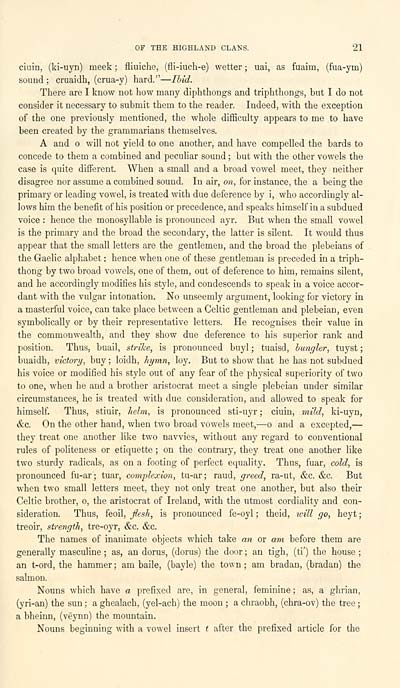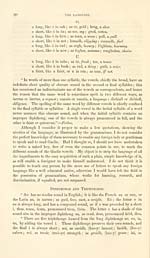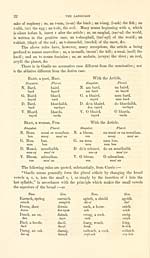Download files
Complete book:
Individual page:
Thumbnail gallery: Grid view | List view

OF THK HIGHLAND CLANS. 21
ciuin, (ki-uyn) meek ; fliuiche, (fli-iucli-e) wetter ; uai, as fuaim, (fua-ym)
sound; cruaidh, (crua-y) hard." — Tbid.
There are I know not how many diphthongs and triphthongs, but I do not
consider it necessary to submit them to the reader. Indeed, with the exception
of the one previously mentioned, the whole diiBculty appears to me to have
been created by the grammarians themselves.
A and o will not yield to one another, and have compelled the bards to
concede to them a combined and peculiar sound ; but with the other vowels the
case is quite different. When a small and a broad vowel meet, they neither
disagree nor assume a combined sound. In air, on, for instance, the a being the
primary or leading vowel, is treated with due deference by i, who accordingly al-
lows him the benefit of his position or precedence, and speaks himself in a subdued
voice : hence the monosyllable is pronounced ayr. But when the small vowel
is the primary and the broad the secondary, the latter is silent. It would thus
appear that the small letters are the gentlemen, and the broad the plebeians of
the Gaelic alphabet : hence when one of these gentleman is preceded in a triph-
thong by two broad vowels, one of them, out of deference to him, remains silent,
and he accordingly modifies his style, and condescends to speak in a voice accor-
dant with the vulgar intonation. No unseemly argument, looking for victory in
a masterful voice, can take place between a Celtic gentleman and plebeian, even
symbolically or by their representative letters. He recognises their value in
the commonwealth, and they show due deference to his superior rank and
position. Thus, buail, strike, is pronounced buyl ; tuaisd, bungler, tuyst ;
buaidh, victory, buy ; loidh, hymn, loy. But to show that he has not subdued
his voice or modified his style out of any fear of the physical superiority of two
to one, when he and a brother aristocrat meet a single plebeian under similar
circumstances, he is treated with due consideration, and allowed to speak for
himself. Thus, stiuir, helm, is pronounced sti-uyr ; ciuin, mild, ki-uyn,
&c. On the other hand, when two broad vowels meet, — o and a excepted, —
they treat one another like two navvies, without any regard to conventional
rules of politeness or etiquette ; on the contrary, they treat one another like
two sturdy radicals, as on a footing of perfect equality. Thus, fuar, cold, is
pronounced fu-ar ; tuar, complexion, tu-ar ; raud, greed, ra-ut, &c. &c. But
when two small letters meet, they not only treat one another, but also their
Celtic brother, o, the aristocrat of Ireland, with the utmost cordiality and con-
sideration. Thus, i&oW, flesh, is pronounced fe-oyl ; theid, will go, heyt;
treoir, strength, tre-oyr, &c. &c.
The names of inanimate objects which take an or am before them are
generally masculine ; as, an dorus, (dorus) the door ; an tigh, (ti') the house ;
an t-ord, the hammer; am baile, (bayle) the town; am bradan, (bradan) the
salmon.
Nouns which have a prefixed are, in general, feminine ; as, a ghrian,
(yri-an) the sun ; a ghealach, (yel-ach) the moon ; a chraobh, (chra-ov) the tree ;
a bheinn, (veynn) the mountain.
Nouns beginning with a vowel insert t after the prefixed article for the
ciuin, (ki-uyn) meek ; fliuiche, (fli-iucli-e) wetter ; uai, as fuaim, (fua-ym)
sound; cruaidh, (crua-y) hard." — Tbid.
There are I know not how many diphthongs and triphthongs, but I do not
consider it necessary to submit them to the reader. Indeed, with the exception
of the one previously mentioned, the whole diiBculty appears to me to have
been created by the grammarians themselves.
A and o will not yield to one another, and have compelled the bards to
concede to them a combined and peculiar sound ; but with the other vowels the
case is quite different. When a small and a broad vowel meet, they neither
disagree nor assume a combined sound. In air, on, for instance, the a being the
primary or leading vowel, is treated with due deference by i, who accordingly al-
lows him the benefit of his position or precedence, and speaks himself in a subdued
voice : hence the monosyllable is pronounced ayr. But when the small vowel
is the primary and the broad the secondary, the latter is silent. It would thus
appear that the small letters are the gentlemen, and the broad the plebeians of
the Gaelic alphabet : hence when one of these gentleman is preceded in a triph-
thong by two broad vowels, one of them, out of deference to him, remains silent,
and he accordingly modifies his style, and condescends to speak in a voice accor-
dant with the vulgar intonation. No unseemly argument, looking for victory in
a masterful voice, can take place between a Celtic gentleman and plebeian, even
symbolically or by their representative letters. He recognises their value in
the commonwealth, and they show due deference to his superior rank and
position. Thus, buail, strike, is pronounced buyl ; tuaisd, bungler, tuyst ;
buaidh, victory, buy ; loidh, hymn, loy. But to show that he has not subdued
his voice or modified his style out of any fear of the physical superiority of two
to one, when he and a brother aristocrat meet a single plebeian under similar
circumstances, he is treated with due consideration, and allowed to speak for
himself. Thus, stiuir, helm, is pronounced sti-uyr ; ciuin, mild, ki-uyn,
&c. On the other hand, when two broad vowels meet, — o and a excepted, —
they treat one another like two navvies, without any regard to conventional
rules of politeness or etiquette ; on the contrary, they treat one another like
two sturdy radicals, as on a footing of perfect equality. Thus, fuar, cold, is
pronounced fu-ar ; tuar, complexion, tu-ar ; raud, greed, ra-ut, &c. &c. But
when two small letters meet, they not only treat one another, but also their
Celtic brother, o, the aristocrat of Ireland, with the utmost cordiality and con-
sideration. Thus, i&oW, flesh, is pronounced fe-oyl ; theid, will go, heyt;
treoir, strength, tre-oyr, &c. &c.
The names of inanimate objects which take an or am before them are
generally masculine ; as, an dorus, (dorus) the door ; an tigh, (ti') the house ;
an t-ord, the hammer; am baile, (bayle) the town; am bradan, (bradan) the
salmon.
Nouns which have a prefixed are, in general, feminine ; as, a ghrian,
(yri-an) the sun ; a ghealach, (yel-ach) the moon ; a chraobh, (chra-ov) the tree ;
a bheinn, (veynn) the mountain.
Nouns beginning with a vowel insert t after the prefixed article for the
Set display mode to: Large image | Transcription
Images and transcriptions on this page, including medium image downloads, may be used under the Creative Commons Attribution 4.0 International Licence unless otherwise stated. ![]()
| Early Gaelic Book Collections > Blair Collection > Treatise on the language, poetry, and music of the Highland clans > (33) |
|---|
| Permanent URL | https://digital.nls.uk/76236766 |
|---|
| Description | A selection of books from a collection of more than 500 titles, mostly on religious and literary topics. Also includes some material dealing with other Celtic languages and societies. Collection created towards the end of the 19th century by Lady Evelyn Stewart Murray. |
|---|
| Description | Selected items from five 'Special and Named Printed Collections'. Includes books in Gaelic and other Celtic languages, works about the Gaels, their languages, literature, culture and history. |
|---|

